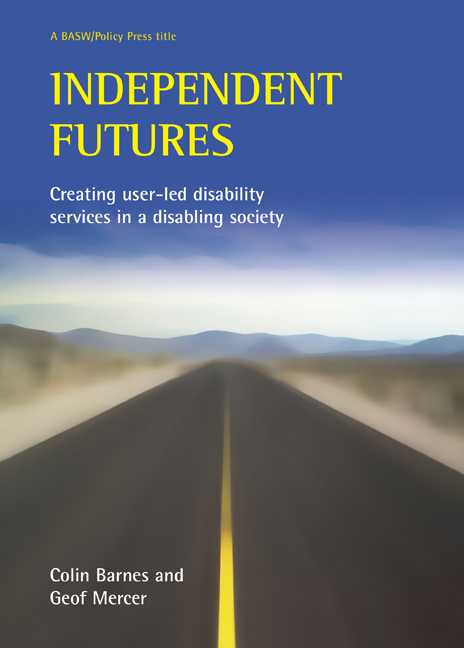Book contents
- Frontmatter
- Contents
- List of figures and tables
- Acknowledgements
- Notes on the authors
- one Examining user-led services
- two Traditional approaches: disability policy and the welfare state
- three Disability activism and the struggle for independent living
- four Researching user-led organisations
- five User-led organisations: building an alternative approach
- six Service design and delivery: opportunities and constraints
- seven Service users’ views and experiences
- eight Politics and campaigning
- nine Policy change or retrenchment?
- ten Future directions
- References
- Index
seven - Service users’ views and experiences
Published online by Cambridge University Press: 15 January 2022
- Frontmatter
- Contents
- List of figures and tables
- Acknowledgements
- Notes on the authors
- one Examining user-led services
- two Traditional approaches: disability policy and the welfare state
- three Disability activism and the struggle for independent living
- four Researching user-led organisations
- five User-led organisations: building an alternative approach
- six Service design and delivery: opportunities and constraints
- seven Service users’ views and experiences
- eight Politics and campaigning
- nine Policy change or retrenchment?
- ten Future directions
- References
- Index
Summary
Introduction
This chapter, first, foregrounds users’ experiences using mainstream, community-based support services. A contrast is drawn with disabled people's experiences of user-led services. The discussion concentrates on the perceived advantages and disadvantages of the two forms of provision. Second, consideration is given to the impact of current economic and policy contexts on the promotion of ‘independent living’. As previously noted, the growing emphasis on market forces and user involvement in government policy statements has provided a fertile context in which user-controlled initiatives have developed. Although small in number, organisations controlled and run by disabled people have provided a range of services that represent an alternative option to traditional, professionally led provision.
Third, there is a more detailed examination of the key aspects about user-led services that users believe set them apart from mainstream statutory and voluntary services. These range over the process of assessment of support needs through the quality and range of services to central claims by organisations of disabled people that user-controlled agencies provide greater choice and control to individual disabled service users. More specifically, the development of direct payments over recent years has provided an important opportunity for disabled employers of personal assistants (PAs) to draw on the wide-ranging experience of disabled people working in user-led organisations.
The final section considers the responses of research participants to questioning about the drawbacks and shortcomings in their experience of user-led services, and whether there was a discrepancy between the aims and objectives of user-controlled organisations and actual practice, and if so, what might be the explanation.
Views on mainstream services
The disabled participants in the Creating Independent Futures study received a range of services provided by a variety of providers: statutory, private and voluntary. The majority, 68, had used or were still using services supplied by local authority social services departments. These included the allocation of a social worker and/or case manager, home adaptations, home helps, and day centre placements. These services were delivered by different divisions within local authority social services departments, such as those for ‘physical and sensory disabilities’, ‘mental health’, ‘learning disabilities’ and ‘community care’.
Several people were also receiving services provided by health authorities, large charities, local voluntary organisations and private agencies. Health authorities offered in-patient ‘care’, occupational therapy and physiotherapy services (12 people).
- Type
- Chapter
- Information
- Independent FuturesCreating User-Led Disability Services in a Disabling Society, pp. 115 - 136Publisher: Bristol University PressPrint publication year: 2006



